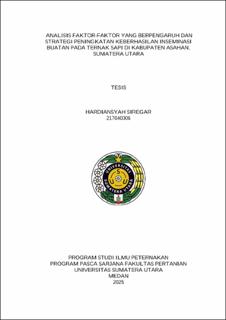Analisis Faktor-Faktor yang Berpengaruh dan Strategi Peningkatan Keberhasilan Inseminasi Buatan pada Ternak Sapi di Kabupaten Asahan, Sumatera Utara
Analysis of Influential Factors and Strategies to Increase the Success of Artificial Insemination in Cattle in Asahan Regency, North Sumatra

Date
2025Author
Siregar, Hardiansyah
Advisor(s)
Umar, Sayed
Galingging, Simon Elieser
Metadata
Show full item recordAbstract
The slow growth of the cattle population is generally caused by the suboptimal knowledge of reproductive management at the farmer level and the performance of livestock that is not in accordance with their growth period. Suboptimal reproductive management has implications for the number of repeated Artificial Insemination (AI) incidents or Service per Conception (S/C) which is still high so that the calving interval is longer than normal. Suboptimal cattle reproductive management will cause major losses for farmers both in material and immaterial terms. The purpose of this study was to determine the success of Artificial Insemination (AI) in Asahan Regency, to analyze what factors influence the Success of Artificial Insemination in Asahan Regency, and to formulate a Strategy to Increase the Success of Artificial Insemination in Asahan Regency. The data collected in this study were primary data and secondary data. The data obtained were then analyzed using multiple linear regression statistics, after which a SWOT analysis was carried out. The AI program in Asahan Regency was quite successful, this was indicated by the average S/C value ranging from 1.69, CR ranging from 61.4%, and NRR ranging from 67.92%. Based on the results of the F test (simultaneous), the calculated F value is obtained > F table, so that the independent variables simultaneously affect the success of AI. The results obtained are the calculated F value (37.688) > F table (2.198) and the value (Sig) <0.001 is smaller than 0.05. Policies needed to increase the success of AI include utilizing government support and genetic improvement, implementing livestock health and nutrition improvement programs, improving ongoing education and training programs, utilizing opportunities for collaboration with academics and researchers.
Collections
- Master Theses [109]
